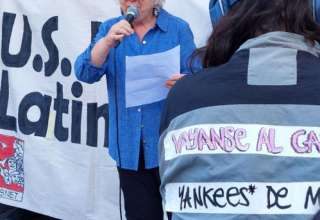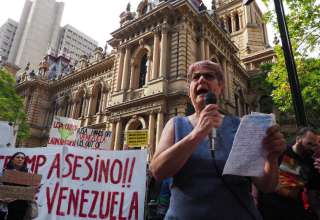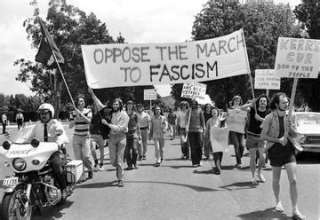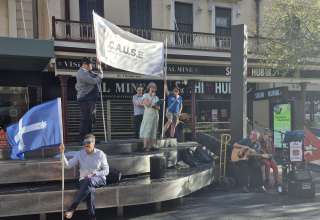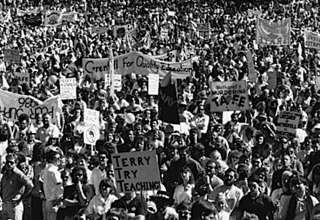by Shirley Winton from Spirit of Eureka
Presented to the ILPS (International League of Peoples’ Struggle) Australia – General Meeting 22 October, 2022
I speak as a member of Spirit of Eureka, but some of the comments are my personal views.
I acknowledge that I’m on the unceded land of the Wurundjeri people of the Kulan nation. I pay my respects to their elders past, present and emerging and stand in solidarity with the First Nations people’s struggles for justice, self-determination and genuine Treaties.
The First Nations people’s struggle and resistance to invasion and colonisation of their country started in 1788 and hasn’t ceased in the 235 years. The resistance to brutal colonial oppression and genocide takes many forms, including organised armed resistance by the Aboriginal people from the late eighteenth century and throughout the 19th and early 20th centuries.
Their struggle for survival and justice has been passed from generation to generation and continues today unabated.
Australia’s economy and conditions of working people

From the beginnings of its colonial origins the settler Australian economic development was built on foreign capital, mainly British until after WW2 when US capital took over the main life lines of Australia’s economy. These early beginnings laid the ground for continuing imperialist domination and dependency of Australia’s capitalist economy on foreign capital, mainly US and European. More recently Chinese capital investment has started to make an appearance, still small, but growing.
Today US capital makes up the largest foreign investment in Australia. The small local monopoly class (Gina Rinehart, Twiggy Forrest, etc) depend for their survival and expansion on overseas finance capital. For example, the stamp of Blackstone, the US global finance capital monopoly, underpins many corporations operating in Australia.
The class that controls a country’s economic base has the greatest influence and power over political, economic and military policies and culture of that country.
Foreign capital overwhelmingly dominates Australia’s financial and minerals and export resources industry, either through direct operations of foreign monopolies eg. Chevron, BHP, AGL, or indirectly through loans to local monopolies – Gina Rinehart, Twiggy Forest, the 4 major Banks.
Imperialism is not simply military aggression, wars and occupations. Lenin wrote extensively on characteristics of economic imperialism which is the source of wars of aggression, invasions and military occupations.
Australia’s ruling class has always been an appendage of a colonial or imperialist power – first the British colonialists, and since WW2, the US. Fundamentally, Australia’s ruling class mainly serves the dominant foreign capital. Even the more progressive sections aspiring for more independence and sovereignty for Australia (e.g. rank and file in the Labor Party, Whitlam) are silenced or removed. Loyalty to US imperialism, has been the main and common feature of successive Liberal and Labor governments.
This loyalty to US hegemony has been strengthened at a time of increasing economic competition between US imperialism and China’s growing investments around the world. The US is more belligerent and aggressive against China’s economic expansion and demands its allies, including Australia, protect and expand US economic and political hegemony in Australia and in the region. Eg. US threatened Australia if it became involved in China’s Road and Belt to secure Chinese investments. In May 2020, Pompeo, the former US Secretary of State in Trump’s administration did an overnight stopover in Australia demanding the Victorian State Labor government terminate its In Principle Agreement with China’s Belt and Road project which enabled China to invest in the development of Victorian infrastructure. Pompeo loudly threatened Victorian and Federal governments that the US would end its friendly relations with Australia, if the Belt and Road In Principle Agreement would proceed. An equally loud chorus of Liberal and Labor MPs immediately assured the US that Australia does not support Chinese investments, and condemned the Victorian Labor government.
This is just one of many examples of how the contention between US and China is being played out in Australia’s political, economic and military affairs.
Economic
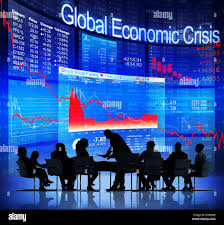
The global economic crisis today has been in the making for over 40 years. The 2008 GFC, the Covid Pandemic and the super power contention between imperialist US/EU, Russia and China (exposed in the current imperialist proxy war over Ukraine) have exacerbated and accelerated the global economic crisis. It is the inevitable and unstoppable decay of monopoly capitalism that is plunging the world into another imperialist war.
In Australia, global imperialism, or the neo liberal stage of monopoly capitalism, introduced in the 1980s, resulted in the deindustrialisation of Australia and widespread privatisation. It opened the door to intensified exploitation for profit maximisation for the monopoly capitalist class. The greater intensified exploitation of workers and the environment, the greater hardships for the people and plunder of the environment. Widespread casualisation of work, low wages, unaffordable housing, rising cost of living, rising cost of power and instrumentalities, have sharpened the class contradictions. Public health and education are at breaking point and have never been in such a deep crisis. This crisis in public health, education, housing, climate can all be traced to the mounting crisis of capitalism where the rate of profit is decreasing. The only way capitalism can survive is through the accumulation of surplus capital, redividing the world’s resources and greater exploitation of workers and the environment. The ordinary people are forced to carry the burden of capitalist crisis.
In a wealthy, developed country like Australia rich in natural resources and a small population, nearly 14% of the people exist under the poverty line, that’s 3.24 million living in poverty. And these numbers are underestimated. Many migrant workers on temporary visas, international students eking out an existence, unaccounted homeless people, and others living in poverty are not included in the poverty statistics. A third of 3.24 million living below the poverty line are the working poor, many migrant workers. The largest group of children living in poverty are in single parent families. Domestic violence is a major contributor to women living in poverty.
Political Parties
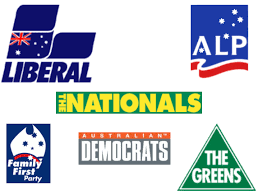
In the recent Federal elections, the people threw out the unpopular conservative Coalition Morrison government. However, nationally the vote for both major political parties fell. Liberals lost many of their long held secure seats. Mainly to Teals, the more socially progressive alliance of community based independent candidates who campaigned on the environment, integrity in parliament, equality for women, and socially progressive issues. Similarly, and significantly, the vote in strong working class Labor held seats, previously held with a large majority, also fell. At the same time the vote for the Greens went up with the Greens taking seats from Labor. Labor came in to government with promises to improve funding for child care, aged care, health, education, mitigate climate crisis , some protection of the environment, equality for women and an increase in wages, parliamentary integrity and taxing multinationals. In its first few weeks in government, Labor introduced a number of socially progressive measures. But Labor cannot deliver on most of the promises it made that will benefit the people, because to do so requires a change to economic structure and which the big monopoly capital would not accept – eg taxing multinationals. There are no differences between the two major parties in their total subservience to US in foreign policies, war mongering towards China and upholding the US imperialist hegemony in the region. It remains to be seen if Penny Wong’s soft diplomacy in the Pacific Countries is for genuine independent development of the Pacific nations or is it a strategy to retain the US hegemony against China’s economic advancements in the region. Before and since the elections Penny Wong has continued to maintain her pro US, anti-China rhetoric. Distinction needs to be made between ALP political leadership and the rank and file members who continue to work and hope that Labor will return to its working class roots.
Workers and Unions

Australian working class has a long history of high union membership and militancy. At times the membership has been over 60%. But in the past 10-15 years union density has hit the floor at 12%. Until recently, workers and their unions relied mostly on their own collective strength and militant struggle on the ground to win increases in wages and improvement to their conditions. Unions were involved in social, political and community struggles, prominent in leading struggles against imperialist wars and standing up in solidarity with international working class struggles. Working class political consciousness gave confidence and empowered workers in struggle.
Imperialist globalisation of the 1980s-90s, the neo-liberal stage of capitalism, began removing obstacles standing in the way of intensifying the exploitation of workers and increasing the concentration of global monopoly capital. Major changes were made to Australia’s capitalist economy and industrial relations, first by the Hawke Keating Labor governments, and built on by the Howard Coalition government in the following 15 years. The Accord, created by the Hawke Labor government and assisted by the peak union leadership, was designed to hose down working class militant struggle and weaken workers’ organisations, clearing the way for capital to intensify exploitation of workers.
Australia’s capitalist economy was opened up for greater plunder by foreign capital.
The economy and the finance sector were deregulated, restrictions on global finance capital were removed, sweeping privatisation of public assets and instrumentalities to foreign capital, casualisation and de-industrialisation. Major attacks were launched on unions and workers. Truckload after truckload of laws with extensive anti-worker and anti-union powers were wheeled out to weaken the organised working class.
Soft and hard tactics were used to crush union militancy and organisation. The Accord promoted the myth that the class interests of labour and capital under capitalism are identical and can be reconciled. That class struggle was not necessary when Labor is in power. Therefore, this narrative went, there’s no need for workers to struggle at the gate, on the ground, instead it should be left to union leaders and bosses to make deals. At the same time as this narrative was being promoted the capitalist state was rolling out anti-union and anti-worker laws and co-opting some top union leaders.
Today, casualisation and the gig economy are gutting workers’ organisations.
Top union leadership directs struggle to parliamentarism and electing a Labor government. The fear of breaking laws, being fined and jailed, combined with little experience and confidence in the power of organised working class, is paralysing some in the union leadership. Ambitions for parliamentary careers gets in the way of some union leaders, in serving the workers.
Yet in spite of the difficulties for the working class and the people, workers are compelled to fight, demanding higher wages, better conditions and job security. Health care and aged care workers, teachers, workers in mining, manufacturing and food industries, cleaners, public transport workers, agricultural workers, retail workers are continuing to fight. Wharfies and seafarers are in constant battle with international shipping monopolies. Workers at the Altona Petrochemical Company Qenos in Melbourne’s west, have been on strike for weeks demanding better wages and conditions and protection of jobs. Qenos is owned jointly by China National Chemical Corporation and the US private Equity Blackstone Group – one of the world’s biggest finance monopolies, mentioned earlier. Workers at APPIN Coalmine in southern NSW have been striking for wages and conditions. APPIN Colliery is owned by BHP which is 72% owned by US investors. Young workers in the new and more militant Retail and Fast Food Workers Union are organising and fighting on the job refusing to be intimidated by bosses, and inspiring other young workers to struggle.
Environment
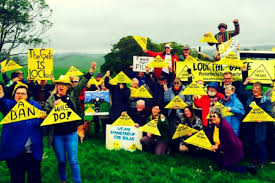
The people’s environment movement has grown exponentially. Activism and struggle against multinational fossil fuel corporations, against uranium mining, nuclear dumps and nuclear weapons, deforestation and plunder of the First Nations people’s land, is growing. Environmental activism and demands to protect the environment and mitigate climate change, once ridiculed and condemned, have entered the mainstream, no longer able to be dismissed. Facts and science can no longer be denied by the profiteering fossil fuel corporations. The voices and militant actions by young people are growing in strength and gaining wide support. In the front lines of environmental struggles are Australia’s First Nations People taking on the mining corporations to stop the plunder of their stolen country.
Democratic Rights
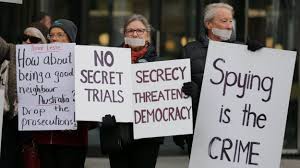
Past 20 years have seen people’s democratic rights being systematically erased. People’s rights to protest against destruction of the environment, to speak out and expose injustices, are being hollowed out. Many workers’ rights won by the working class over many years of struggle have disappeared. Workers’ fundamental rights to organise collectively, to fight for wages, conditions and working class solidarity, are vanishing. The environment movement is being pelted by a raft of anti-democratic laws sweeping across most states of Australia.
At the same time as workers’ and people’s rights are attacked, the capitalist state is giving more judicial and military power to the institutions of capital for suppression of the people. The power of capital is expanding in the same proportion and rate as the rights of working people are shrinking.
Workers in Australia never had the right to strike enshrined in the law. In fact, strike action has always been unlawful. Yet for decades in the 20th century workers and many of their union leaders ignored bosses’ threats and went on strike or took some kind of industrial action constantly, without notifying the bosses or the state. Workers and their unions relied on the collective strength of the rank and file and communities on the ground around them. The defiant and militant working class consciousness and struggle discouraged the bosses and the state to take on the well organised workers and their fearless leaders. Socialist consciousness empowered workers and instilled confidence in the future of the working class.
Since the 9/11 in 2001, under the cover of stopping terrorist attacks and the national security, the Australian capitalist state brought in numerous anti-democratic laws against the people. But everything has to be analysed from a class position of whose interests are being served. The so-called anti-terror laws are so broad and all inclusive that they can be, and are intended, to be used against social and political activism of the people fighting for the environment, workers’ rights, the right to expose, speak out and protest against injustice.
Recently, the powers of the state’s armed forces, police and the army, have been further expanded and strengthened. Police and the state’s intelligence agencies have been gifted with extraordinary wide surveillance powers to spy, and crush the people in struggle. The powers of the army have been expanded to intervene in civil protests and break workers’ strikes and protests. The state has taken advantage of the Covid pandemic to expand its oppressive powers against the people. The new and stronger state powers are laying the ground for fascism.
Even the long held bourgeois democratic rights upheld as the pinnacle of capitalist democracy are being swept aside to protect monopoly capitalism and US imperialism. Eg. Whistleblowers, Julian Assange and David McBride for exposing US and Australian war crimes in Iraq and Afghanistan respectively, Bernard Collaery (East Timor gas).
Imperialism and war

The crisis of capitalism and the intensifying economic rivalries between US/NATO on the one hand and Russia and China on the other, is leading to a global military conflict, an inter-imperialist war. The rivalry between US/NATO and Russia for the economic control of the former Soviet Republics is threatening to engulf the world in a war, potentially a nuclear war. The proxy war over Ukraine is complex and confusing for many because the past socialist history of Russia and former soviet republics conceal the present capitalist nature of Russia. US/NATO are the instigators of war over Ukraine. But the justified hatred of US imperialism can distract from the reality of capitalist Russia with imperialist ambitions. The revisionist dismantling of the former Soviet Union is one of the major contributors that has led to the present proxy war over Ukraine.
The US has been the dominant hegemon in Asia-Pacific and Australia its deputy sheriff in the region.
For more than 70 years a people’s movement for Australia’s independence from the US economically, politically and militarily has continued to grow. There’s broader understanding of the harm the US and the military alliance is having on the people of Australia and in the region. Campaigns for an independent foreign policy, removing US military bases and US troops from Australia, and ending the US-Australia military alliance are more widely supported. The powerful influence of multinational weapons corporations, mainly US Lockheed Martin, Raytheon, Boeing, on industries, political decisions and on our schools and universities, has many people worried. In short, the US-led militarisation of the country.
The recent formation of the US-led AUKUS military pact, acquisition of 8 nuclear propelled submarines and the revamping of the Quad, is signalling war preparations against China and the central role the US has carved out for Australia as its deputy sheriff in the military conflict with China. Australia’s military is now interoperable and interchangeable within the US military and tied to its military industrial complex.
AUKUS is a replica of NATO in Indo-Pacific and Asia-Pacific.
AUKUS and the nuclear propelled submarines have galvanised and brought together peace, environment, anti-war and socialist groups under unifying and broad demands for Peace, and dumping AUKUS and nuclear subs. The movement for peace and independence has enormous potential to develop into a broad united front against war and the US. Greater political anti-imperialist class consciousness will grow.
It needs to be stated that genuine independence can only be won and sustained by socialism. The system that truly invests power in the working class and the people.
So, this is a quick and wide brush stroke report on the Australian situation and conditions. It only outlines the breadth of people’s movements and raises many questions. It is not intended to provide answers or a blue print. The answers can be found in the course of our involvement in struggles with the people.
The pressing question is what are our main task in today’s conditions of economic, political, environmental and social crises of capitalism and imperialist war. We have the powerful scientific tools of Marxism. They are general and universal principles which are continuously enriched and developed through our practice and study of the ever-changing conditions. The task is to develop skills to implement and bring to life these principles in the concrete conditions of struggle. Being with the masses in struggle, close study of our conditions and the real world, is where the answers can be found and new questions and problems will inevitably arise.
Anti-imperialist consciousness cannot be imposed superficially. It can only be grasped and understood by the masses in the course of direct concrete experience and struggles in the real world around us. Similarly, an anti-imperialist united front can only emerge from within the struggles of the people.
Capitalism lays the foundations for socialism and sows the seeds of its own destruction.
Socialism releases the powerful potential of collective mobilisation – people power. We need only to look at the spontaneous collective initiative and mobilisation by the ordinary people during natural disasters, and be inspired with confidence in the future of the people and the planet.
Obviously, this brief outline does not cover every aspect of Australia’s situation and I very much welcome your comments and contributions to fill in the gaps and relate your views and experiences.


